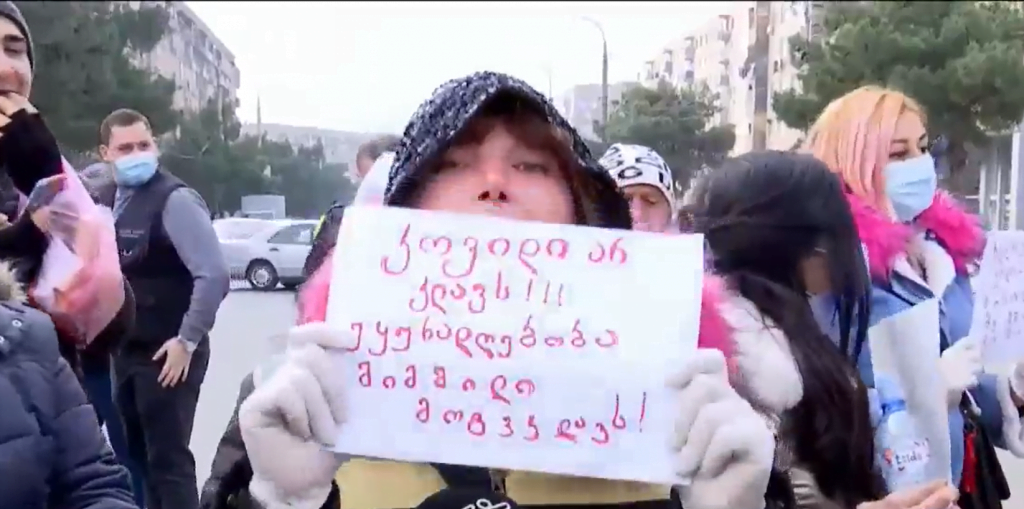The Georgian Government’s newly introduced COVID-19 lockdown, in effect since November 28 across much of the country, sparked social discontent and protests in various parts of Georgia, involving street vendors, business owners, and opposition politicians.
In the capital city of Tbilisi, street florists tried to block the road on November 30, demanding permission to continue outdoor trade. The protesters voiced their concerns over losing the source of income due to restrictions and being unable to make ends meet. A group of the florists continued selling flowers in defiance of restrictions.
At a government press conference, Beka Peradze, Head of Labor Inspection Department of the Health Ministry charged with overseeing adherence to labor standards, remarked that the protesting street flower vendors are still allowed to move their businesses online. “Similar activities are restricted around the whole world to reduce mobility,” Peradze explained.
A group of street vendors in Rustavi, Georgia’s fourth-largest city southeast of Tbilisi, also hit the streets to protest the restrictions, asking Rustavi Mayor Irakli Tabagua for support and pledging to continue protests if their demands were not met. Protesters complained that they were not eligible for government’s financial assistance programs envisaged for those affected by the pandemic-induced economic crisis. Responding to the demands, Rustavi Mayor spoke about offering the street vendors alternative indoor rooms to continue their business activities.
Another rally was held in the coastal city of Batumi on November 30, where opposition supporters and activists, gathered as part of broader post-election anti-government protests, reportedly called on street vendors and food business owners to defy the lockdown rules and erect stands to sell their products outside the local government building.
The demonstration later grew into a series of verbal and physical confrontations with police, resulting in the arrest of one. Media reports also showed several manifestants sustaining injuries.
Earlier on November 28 in Batumi, a fitness center owner announced another “act of disobedience” continuing to host the gym-goers despite the restrictions to protest “injustice” that impoverishes people. The Labor Inspection eventually fined the facility by GEL 10,000 (USD 3,016) for defying the lockdown rules.
The story gained further prominence as the owner was publicly backed by Zurab Japaridze, leader of right-libertarian Girchi party, who then rented the fitness club as his private home to allow gym members to continue their regular visits.
Scores of law enforcement officers forced to seal the gym nevertheless, with the Ministry of Interior opening an investigation involving criminal liability for repeated violation by a person/entity already charged with breaching the rules of isolation and quarantine.
Georgia added 3,216 new coronavirus cases on November 30 to its tally of total confirmed cases, amounting to 135,584. 94,857 cases were confirmed in November alone, with the number of active cases standing over record 20,000 in the past three days. 1,267 citizens have died of the virus since the onset of the pandemic.
This post is also available in: ქართული (Georgian) Русский (Russian)

